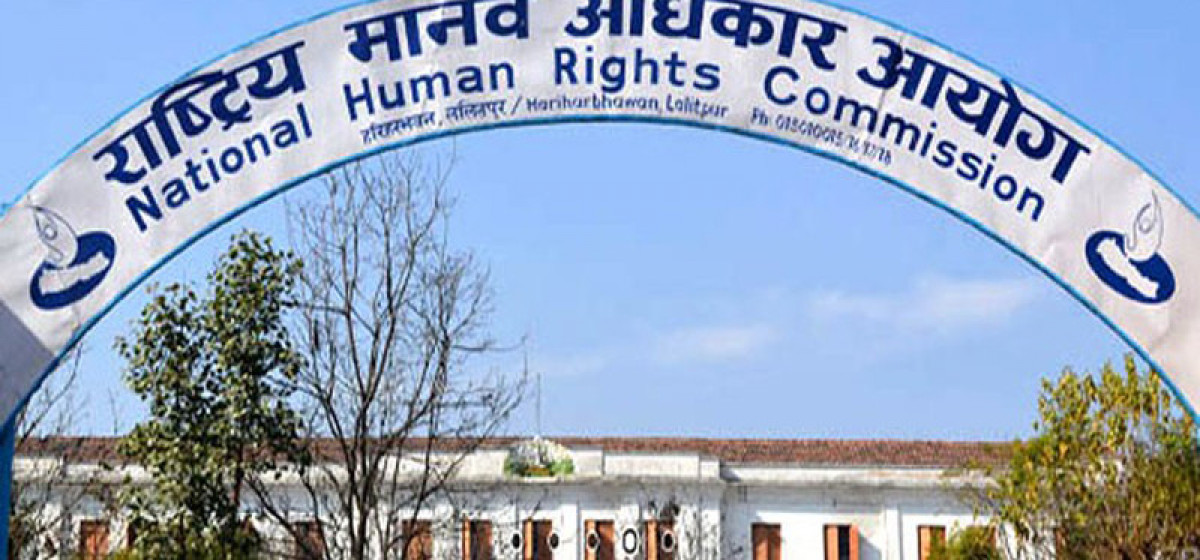KATHMANDU, June 30: The National Human Rights Commission (NHRC) has urged the government to cease all forms of criminal torture against individuals in custody and prisons and to fully implement the NHRC's recommendations. The NHRC made this appeal because the government has not given priority to the recommendations made in response to complaints of torture submitted to the NHRC.
The NHRC received 370 complaints related to torture. Among them, final decisions were made on 55 complaints in this fiscal year. The commission recommended the government provide compensation and take action on 22 of these complaints. Compensations amounting to Rs 330,000 were recommended for 17 individuals, and action was recommended against 16 individuals. However, the NHRC has expressed concern that the government has not prioritized taking action as per the recommendations.
The NHRC has been directing the government to make prisons and detention centers free from torture to protect rights against torture. Article 22 of the constitution stipulates that 'no person who is arrested or detained shall be subjected to physical or mental torture, or treated with cruel, inhuman, or degrading behavior’. Such actions are punishable by law, and victims have the right to compensation. The National Penal (Code) Act, 2017, defines torture as a criminal offense. The Compensation Relating to Torture Act, 2053 (1996) includes provisions for compensating torture victims, among other measures.
As Nepal is a party to the Convention Against Torture, 1984, it recognizes torture as a crime against humanity. Despite national and international legal provisions, complaints and monitoring by the NHRC indicate that the practice of torture has not been eradicated. Torture victims from the armed conflict have also not been able to experience justice for years.
NHRC urges three tiers of govt to be serious on DRR

"To ensure access to justice for torture victims, the NHRC urges all concerned parties," stated the NHRC on the occasion of the International Day in Support of Victims of Torture on June 26.
A 16-year-old girl from Madhesh Province (name withheld for privacy protection) was arrested by the police. The girl was taken into custody in mid-April 2022 on charges of murdering a person who allegedly attempted to rape her.
Two days after her arrest, police officers took her to an interrogation room. Male officers held her legs while a female officer repeatedly struck on her legs with a plastic pipe. The following day, the girl was subjected to the same torture for another two hours.
The girl had been handcuffed overnight in the detention room. In mid-May 2023, the Kathmandu District Court had ordered her to be sent to a juvenile correctional facility. Later, she was released under the guardianship of her parents by the order of the Patan High Court.
In Nepal, there is documentation of torture occurring in various types of detention. Amnesty International and Advocacy Forum-Nepal have documented dozens of cases of torture in police custody, detention centers like jails, and juvenile correction homes. Many deaths in police custody have also been attributed to torture.
The families of torture victims are frequently fearful of the police. According to records from Amnesty International and the Advocacy Forum, they have refrained from filing complaints against police officers accused of torture. On the occasion of the International Day Against Torture, a document was released urging the government to eliminate torture and other forms of ill-treatment in custody.
Over the past three decades since becoming a party to the United Nations, Nepal has not fulfilled its commitment to eradicate torture and other forms of ill-treatment. The Criminal Code categorizes torture as a criminal offense, punishable by up to five years' imprisonment for the perpetrator in addition to compensation for the victim. However, legally, no one has been convicted for acts of torture in the country so far. This highlights a pervasive impunity and lack of accountability for torture, revealing a deficit in political will to address such grave human rights violations.
Many incidents of torture remain undisclosed to the public. Following the enactment of the Criminal Code, Advocacy Forum-Nepal has documented 109 cases of torture and deaths in various detentions. According to the documentation, the investigation and research into allegations of torture lack effective and independent mechanisms. The government has exacerbated impunity by not taking punitive measures. Opportunities to mitigate torture crimes in detention centers have been overlooked.
The National Penal (Code) Act, 2017 includes a special provision to prevent refusal to register complaints. However, instances have been cited where victims went to the police station to file complaints of torture, only to have their cases dismissed without investigation. Additionally, there are allegations of tampering with the evidence and coercion of victims, forcing them to retract their statements. Human rights activists and civil society organizations have consistently raised concerns about the absence of an independent investigative mechanism for cases involving torture by police officers.
The Supreme Court had ordered the government to establish an independent mechanism to investigate gross human rights violations committed by security forces. There is a statute of limitation of six months for cases involving torture. The short deadline often prevents victims from obtaining compensation as per the law. International judicial decisions, reviews, and other international legal documents clarify that there is no statute of limitations for torture under international law and standards.
Amnesty International and Advocacy Forum have urged for the establishment of an independent mechanism to investigate allegations of torture. They have recommended regular and independent investigations in all detention centers by government officials and representatives of civil society. Additionally, the NHRC has urged for prompt and serious implementation of recommendations made in cases of torture and similar incidents. Moreover, the Supreme Court has instructed immediate implementation of its order to establish a ‘Compensation Fund’ for providing compensation to torture victims.






























